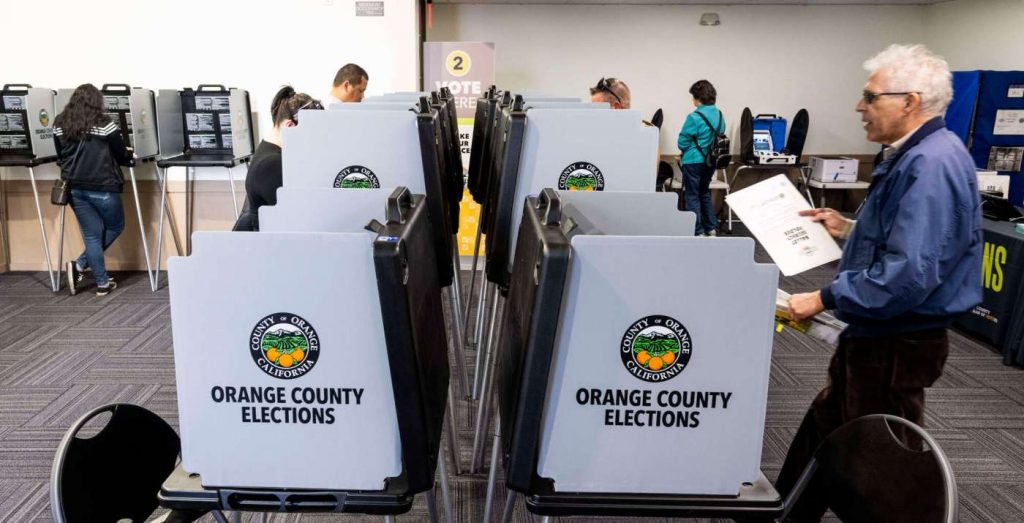Voter turnout in California’s primary is on track to be among the lowest ever.
As of last Friday morning, only 20% of registered voters across the state participated in the Super Tuesday primary, according to preliminary numbers from the secretary of state’s office.
Keep in mind that ballots sent by mail — as long as they are postmarked by Tuesday and received within seven days of election day — will continue to be counted in the coming days. There are an estimated 2.73 million ballots left to count, according to the secretary of state’s office.
See the latest election results.
Still, those outstanding ballots aren’t expected to change voter turnout projections by much at all.
California moved its primary election to March ahead of the 2020 presidential election, opting to hold it on Super Tuesday, an election day when the greatest number of states hold primary contests. Voter turnout that year in the primary was nearly 47% statewide.
This year, California again was a part of Super Tuesday. So what caused such a lackluster turnout this go-round, particularly in a presidential year?
Increasingly divisive politics and fairly humdrum races on the ballot are to blame, political experts say.
Despite having an early primary, the presidential primaries were almost all but decided by the time ballots were mailed to voters in early February. It was clear that 2024 would be a rematch between President Joe Biden and former President Donald Trump.
The biggest race, then, was for California’s open U.S. Senate race — and even then, that seemed partially decided by election day, said Matt Lesenyie, who teaches political science at Cal State Long Beach. Even in the debates among the top four candidates — Democratic Reps. Adam Schiff, Barbara Lee and Katie Porter and Republican ex-Dodger Steve Garvey — there were no fireworks or particularly controversial candidates.
“The core reason the turnout is down: There isn’t a blockbuster campaign at the top of the ticket,” said Lesenyie. “It’s hard to hold our attention these days, and the hottest and the most important and expensive race on the ballot was still a bit of a sleeper.”
Trump, thanks to a rules change by the California GOP last year, is set to sweep up all of California’s 169 delegates. And after her losses on Super Tuesday, former South Carolina Gov. Nikki Haley exited the Republican presidential primary.
Another reason voters may have stayed home is the nature of politics today, said Ann Ravel, a former Federal Election Commission chair during the Obama administration.
“People either don’t feel motivated to vote, or perhaps the problem that I see — not just across the country, but in California, as well — there’s so much divisiveness and that might cause people to not want to go to the polls,” Ravel said, adding a particular concern is low turnout from younger voters.
“It really is a detriment to our country that people are not motivated enough to vote or (they do not) think it will make a difference,” she said.
In California, every registered voter is mailed a ballot that can be mailed back, placed in a drop box or taken to a vote center. Despite the mail option, Lesenyie said many voters are still choosing to drop off their ballot in person, whether that’s at a drop box or vote center.
“I read that as more of the norm, that there’s a practice of voting, and to make it count, you have to jump through some hoops,” he said, equating to a preference of reading a physical book rather than an e-book on a tablet.
At a Dana Point vote center, Tuesday, March 5, was one of the busiest days, officials said. The location had drawn voters who had come to the harbor to enjoy the annual Festival of the Whales, but election day brought steady and heavy traffic, they said.
Among them was Kevin McCarthy — a Dana Point resident, not the former speaker of the House — who was concerned his voter information was not correct. He had to re-register to vote at the center, the second time that’s happened to him, he said.
Related Articles
Rep. Katie Porter says the California U.S. Senate race was ‘rigged.’ What does she mean?
Prop. 1 — Newsom’s $6.4 billion mental health bond — holds very narrow lead
Santa Clara residents vote to remain the only California city that elects its police chief
What could be next for Rep. Katie Porter after Senate loss?
Why does it take so long for votes to be tallied in California?
And it was a particularly exciting day for Michaela Kay, 18, who was able to register to vote at the center. And when she was done voting, casting her first-ever ballot, everyone clapped for her, Kay said.
“It was a really cool experience,” said Kay.
The vote count process will continue in California for up to 30 days after the election.
“Doing it right takes precedence over doing it fast,” Secretary of State Shirley Weber said.
County election officials have until April 2 to verify voter signatures, conduct post-election audits and report results to the secretary of state’s office. The secretary of state has 38 days after the election to certify the results.
“The time taken to process ballots ensures voters’ rights and the integrity of the election,” said Weber.
Staff writer Erika Ritchie contributed to this report.


